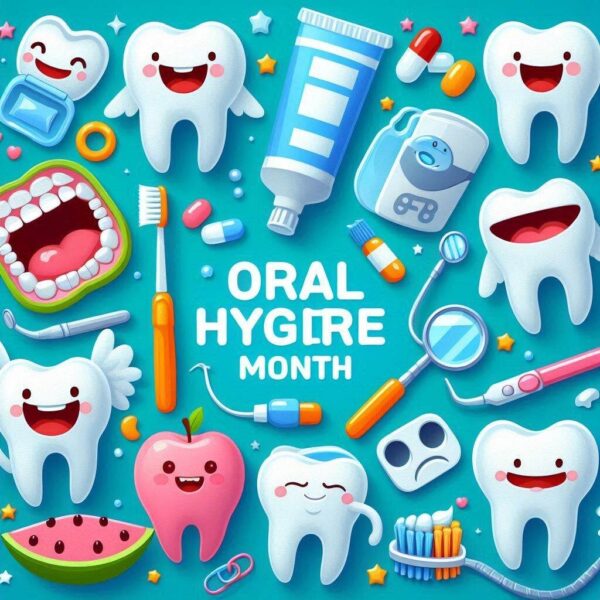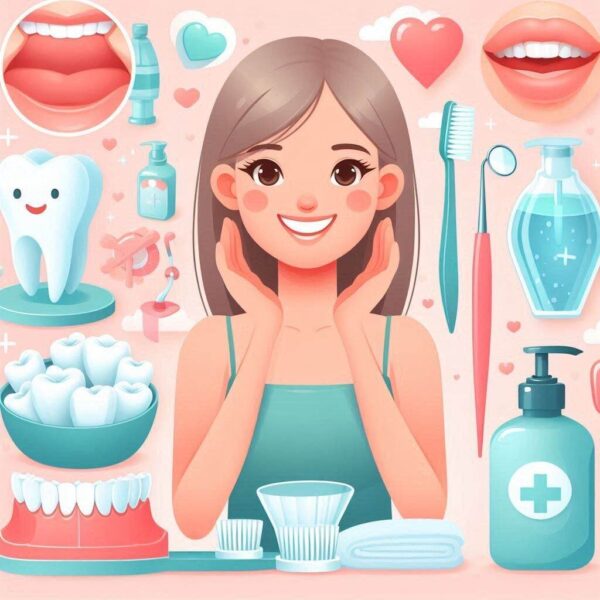
Oral hygiene is not just about having pearly whites and fresh breath; it’s essential for overall health and well-being. Poor oral health has been linked to various systemic conditions, including cardiovascular disease, diabetes, respiratory infections, and even adverse pregnancy outcomes.
By prioritizing oral hygiene, you’re not just taking care of your teeth and gums; you’re also investing in your overall health.
Tips for Maintaining Good Oral Hygiene Month

Brush Twice Daily
Brushing your teeth at least twice a day with fluoride toothpaste is crucial for removing plaque and preventing cavities and gum disease. Make sure to brush for two minutes each time, covering all surfaces of your teeth.
Floss Daily
Flossing helps remove plaque and food particles from between your teeth and along the gumline, where your toothbrush can’t reach. Make it a habit to floss at least once a day to keep your gums healthy.
Limit Sugary and Acidic Foods
Sugary and acidic foods and beverages can contribute to tooth decay and enamel erosion. Limit your consumption of these foods and opt for healthier choices like fruits, vegetables, and dairy products.
Stay Hydrated
Stay Hydrated: Drinking plenty of water throughout the day helps rinse away food particles and bacteria, maintaining a clean and hydrated mouth. Aim to drink water after meals and snacks to help neutralize acids and reduce the risk of cavities.
Visit Your Dentist Regularly
Regular dental check-ups are essential for maintaining good oral health. Your dentist can detect and treat dental issues early, provide professional cleanings, and offer personalized advice for improving your oral hygiene routine.
Get Involved in Oral Hygiene Month
Spread Awareness
Use social media platforms to share oral hygiene tips, fun facts, and the importance of regular dental check-ups with your friends and followers. Encourage them to prioritize their oral health and schedule dental appointments if needed.
Organize Community Events
Partner with local dental clinics or organizations to host oral health education events or free dental check-ups for the community. These events can include dental screenings, educational workshops, and giveaways of dental hygiene products.
Educate Children
Work with schools or youth organizations to provide oral health education programs for children and adolescents. Teaching kids the importance of good oral hygiene habits early in life sets them up for a lifetime of healthy smiles.
Practice Gratitude
Take a moment to appreciate your smile and acknowledge the importance of oral hygiene in your life. Practice gratitude for your healthy teeth and gums, and commit to taking care of them every day.
What is Oral Hygiene Month

Oral Hygiene Month is an annual observance dedicated to promoting good dental health practices and raising awareness about the importance of maintaining healthy smiles. It serves as a reminder to prioritize oral hygiene and take proactive steps to prevent dental issues.
Importance of Oral Hygiene
Why Oral Hygiene Matters
Oral hygiene is crucial for overall health and well-being. Poor oral health can lead to various systemic conditions, including cardiovascular disease, diabetes, respiratory infections, and adverse pregnancy outcomes. By prioritizing oral hygiene, individuals can maintain healthy teeth and gums, leading to improved overall health.
Activities During Oral Hygiene Month
Get Involved in Oral Hygiene Month
During Oral Hygiene Month, individuals and organizations participate in various activities to promote good dental health practices:
Spread Awareness
Use social media platforms and community events to share oral hygiene tips, fun facts, and the importance of regular dental check-ups. Encourage others to prioritize their oral health and schedule dental appointments.
Organize Community Events
Partner with local dental clinics or organizations to host oral health education events or free dental check-ups for the community. These events can include dental screenings, educational workshops, and giveaways of dental hygiene products.
Educate Children
Work with schools or youth organizations to provide oral health education programs for children and adolescents. Teaching kids the importance of good oral hygiene habits early in life sets them up for a lifetime of healthy smiles.
What Do I Need to Know About Dental Hygiene Awareness Month?

Dental Hygiene Awareness Month is an annual initiative aimed at promoting good dental health practices and increasing awareness about the importance of maintaining oral hygiene.
It serves as a platform to educate individuals about the significance of proper dental care and preventive measures to ensure healthy teeth and gums.
Importance of Dental Hygiene
Why Dental Hygiene Matters
Dental hygiene plays a crucial role in overall health and well-being. Maintaining good oral health can prevent various dental issues such as cavities, gum disease, and tooth loss. Additionally, poor oral health has been linked to systemic conditions including cardiovascular disease, diabetes, and respiratory infections.
Activities During Dental Hygiene Awareness Month
Get Involved in Dental Hygiene Awareness Month
Throughout Dental Hygiene Awareness Month, individuals and organizations engage in a variety of activities to promote oral health:
Spread Awareness
Utilize social media platforms, community events, and educational campaigns to share information about proper dental hygiene practices. Encourage others to prioritize oral health by emphasizing the importance of brushing, flossing, and regular dental check-ups.
Organize Community Events
Collaborate with local dental clinics, schools, and community centers to host events such as free dental check-ups, oral health workshops, and dental hygiene product giveaways. These events provide opportunities for individuals to learn about oral hygiene and receive professional guidance.
Educate Children
Implement oral health education programs in schools and youth organizations to teach children and adolescents about the importance of dental hygiene. Focus on instilling good oral hygiene habits early in life to promote lifelong dental health.
The Best Oral Hygiene Habits for a Lifetime of Optimal Oral Health

Understanding Oral Hygiene
Oral hygiene is the practice of keeping your mouth clean and free of disease by regularly brushing and flossing your teeth. It’s crucial for maintaining healthy teeth, gums, and overall well-being. Here’s what you need to know about maintaining optimal oral health:
Why Oral Hygiene Matters
The Importance of Oral Hygiene
Good oral hygiene not only keeps your smile looking bright but also plays a significant role in your overall health. Poor oral health has been linked to various systemic conditions, including cardiovascular disease, diabetes, and respiratory infections. By prioritizing oral hygiene, you’re investing in your well-being.
Essential Oral Hygiene Practices
1. Brushing Twice Daily
Brushing your teeth at least twice a day with fluoride toothpaste is essential for removing plaque and preventing cavities and gum disease. Use a soft-bristled toothbrush and gentle, circular motions to clean all surfaces of your teeth thoroughly.
2. Flossing Daily
Flossing helps remove plaque and food particles from between your teeth and along the gumline, where your toothbrush can’t reach. Make it a habit to floss at least once a day to keep your gums healthy and prevent gum disease.
3. Limiting Sugary and Acidic Foods
Sugary and acidic foods and beverages can contribute to tooth decay and enamel erosion. Limit your consumption of these foods and opt for healthier choices like fruits, vegetables, and dairy products.
4. Staying Hydrated
Drinking plenty of water throughout the day helps rinse away food particles and bacteria, maintaining a clean and hydrated mouth. Aim to drink water after meals and snacks to help neutralize acids and reduce the risk of cavities.
5. Regular Dental Check-Ups
Schedule regular dental check-ups with your dentist for professional cleanings and routine examinations. Your dentist can detect and treat dental issues early, provide personalized oral hygiene advice, and help you maintain optimal oral health.
Conclusion
Oral Hygiene Month serves as a reminder to prioritize our dental health and take proactive steps to maintain healthy smiles.
By participating in activities such as spreading awareness, organizing community events, and educating others about the importance of good oral hygiene habits, we can all contribute to better oral health for ourselves and our communities. Let’s celebrate Oral Hygiene Month by committing to a lifetime of healthy smiles!
FAQs – Oral Hygiene Month
Q1: What is Oral Hygiene Month?
A1: Oral Hygiene Month is an annual observance dedicated to promoting good dental health practices and raising awareness about the importance of maintaining healthy smiles.
Q2: Why is Oral Hygiene Month important?
A2: Oral Hygiene Month is important because it serves as a reminder to prioritize oral hygiene and take proactive steps to prevent dental issues. It provides an opportunity to educate individuals about the significance of proper dental care and preventive measures.
Q3: How can I get involved in Oral Hygiene Month?
A3: You can get involved in Oral Hygiene Month by spreading awareness about the importance of oral hygiene, organizing community events such as free dental check-ups or educational workshops, and educating children about the importance of good oral health habits.
Q4: What are some activities I can participate in during Oral Hygiene Month?
A4: Some activities you can participate in during Oral Hygiene Month include spreading awareness through social media platforms, organizing community events to promote oral health education, and partnering with local dental clinics or organizations to provide free dental check-ups or screenings.
Q5: How can I maintain good oral hygiene beyond Oral Hygiene Month?
A5: Maintaining good oral hygiene beyond Oral Hygiene Month involves adopting daily habits such as brushing and flossing regularly, limiting sugary and acidic foods, staying hydrated, and scheduling regular dental check-ups.
